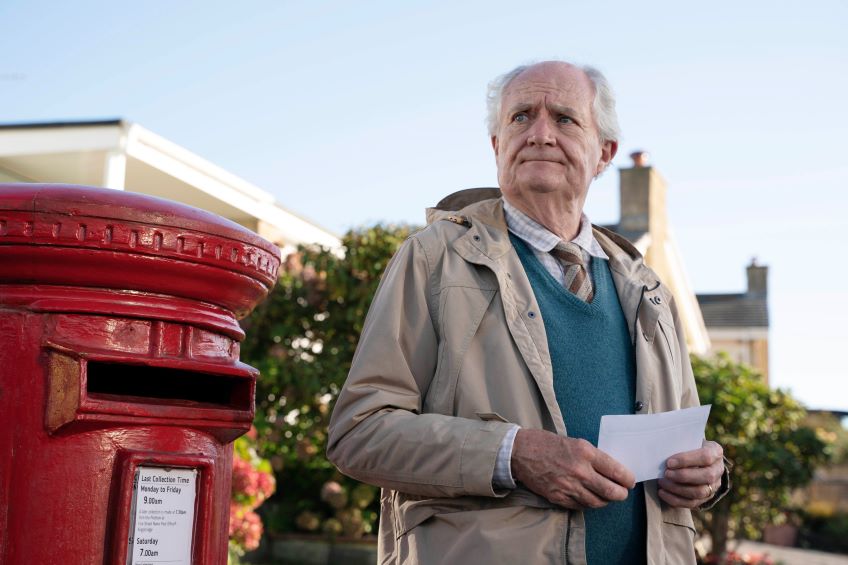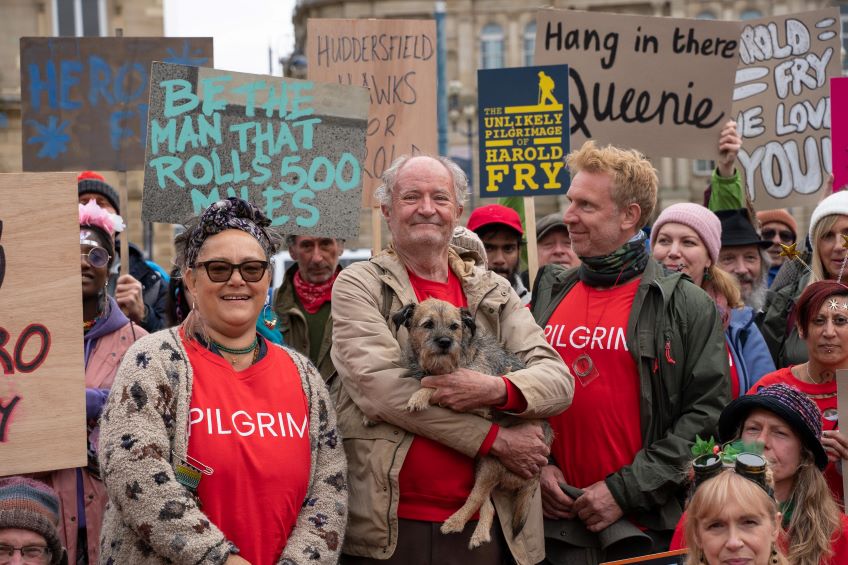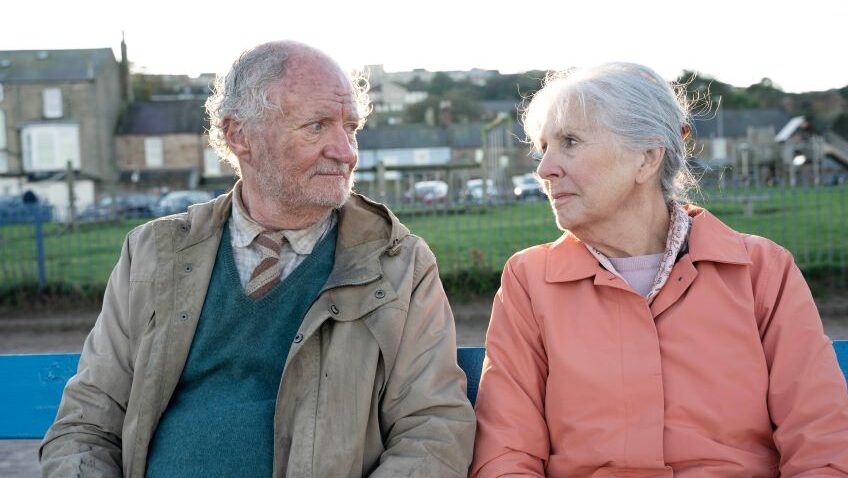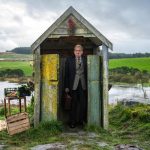Joyce Glasser reviews The Unlikely Pilgrimage of Harold Fry (April 28, 2023) Cert 12A, 108 mins. In cinemas
Back in 2012, Rachel Joyce’s award winning novel about later life redemption and forgiveness was not a shoo-in for a film adaptation. Even twelve years ago, it was risky to release a film starring two septuagenarian actors without the benefit of teen idols coming to their rescue. Since then, there have been many films with older actors in leading roles, although they are seldom worthy of the acting talent.
It took so long for slowpoke Harold Fry to meander onto the big screen that Gillies MacKinnon’s The Last Bus beat him to it in 2021. In that sentimental weepie, Timothy Spall plays Tom, a dull, socially withdrawn retired engineer who takes himself on a physically and emotionally painful pilgrimage across country, becoming a social media celebrity along the way, which is (spoiler alert!) what happens in The Unlikely Pilgrimage of Harold Fry.
Director Hettie Macdonald’s handsomely shot adaptation has the benefit of a script by Joyce herself, and the extraordinary talents of the ubiquitous Jim Broadbent – fresh from his standout performance in The Duke – and the great stage and screen actress Penelope Wilton (The Best Exotic Marigold Hotel, Cry Freedom). But Macdonald’s biggest problems are inherent in Joyce’s beautifully written, if unsatisfactory novel, contrived to tackle universal themes through ciphers.
There is also the character of Fry himself, who, in the book, sounds like he really does suffer from the Alzheimer’s, a condition that his wife Maureen (Wilton) mentions when he does not come home from posting a letter. In fact, 65-year-old Harold has just given up on life and entrusted Maureen with any decisions that are left to make.

Although Harold is socially awkward, withdrawn and cannot even eat in a restaurant without longing to fade into the wallpaper, he was, until recently, a salesman for a brewery, which you’d think would be a job for an outgoing, energetic social type, with the gift of the gab and making others feel special. He lives with Maureen in a soulless, bland, anesthetised house on a suburban street outside of Kingsbridge, Devon and despite having lived there for a long time, they appear to have only one friend between them, a lonely neighbour (Joseph Mydell).
Harold and Maureen refer to their estranged son David (Earl Cave) and both see him in flashbacks in the film from boyhood to a teenager dropping out of Cambridge and taking drugs. We come to understand that David is the reason why Maureen spends all her waking hours cleaning, as if cleaning away the guilt and the hurt that has tarnished her life for the last 25 years. At night, the couple, who both remember the day they fell in love at first sight, sleep separately.
Then one day Harold receives a letter from Queenie Hennessey, who informs Harold she is dying of cancer in a hospice in Berwick-upon-Tweed. All sorts of superficial memories of Queenie run through his mind as he is left to pen a stiff reply (Maureen having rightly refused the task). Queenie was the brewery’s meticulous accountant and Harold often gave her a lift home. In the book, but not in the film, we learn that Queenie, a “spinster” was bullied at work and nearly quits before something far worse happens when she selflessly comes to Harold’s rescue. Harold knows he owes Queenie his thanks, and that is why, when he goes out to post the letter, he knows he has to deliver his message in person.
He also knows that if he goes home to equip himself with proper gear or even a map, he will never go, so he keeps on walking, following the major roads that he drove on for his job. Along the way he meets the attendant of a petrol station (Nina Singh) who tells him a story about the strength of faith in the face of illness that encourages Harold. He phones the hospice and leaves a message that Queenie should wait for him: he is walking to her, and as long as he walks, she must live.
At first Harold stays in cheap hotels, rinsing his underwear, and putting dozens of plasters over his blisters, only for them to fall off. His biggest break (and coincidence) is meeting a Slovakian cleaning lady who was a doctor in her country. She bandages his feet and gives Harold walking gear that belonged to her no-good boyfriend. (Unfortunately, neither she nor anyone else tells him about Compeed, offering a painfree cure (and prevention) for blisters that all hikers used from 2002.) But at a certain point, perhaps feeling guilty about spending the couple’s retirement savings, and more confident in his resolve, he posts his wallet, credit card and razor to Maureen and lives off the land and charity, sleeping in the woods.

Throughout the journey Harold sends postcards to Maureen, Queenie and the girl from the garage and we see flashbacks of David and Queenie. Maureen cleans and frets and if she doesn’t realise how empty her life is, she realises she misses Harold.
Maureen is forced to see her husband in a new light when social media spreads his story (which he brags about to everyone) and his picture is on the cover of dozens of papers. His pilgrimage attracts all sorts of needy people, including, a boy David’s age who tells Harold he has kicked his own drug habit. Soon, food is no problem as pizzas are delivered to the pilgrims, and even the dog that David always wanted (but never got) joins Harold before, the dog, too, grows bored of his companion.
What is more obvious in the film than in the book is how Queenie’s story is marginalised to focus on Harold, and the buried, traumatic emotions surrounding David and his marriage. ‘It is not your fault’ are comforting words, but the truth is that Harold was not a good father. He was unable to show emotion, stimulate his gifted, sensitive son or try to understand why a teenager would be frustrated in such a buttoned up, unchallenging environment.
The script wisely condenses the book’s concluding “coda” chapters, but at the end, after Harold has had plenty of praise and attention for his pilgrimage, the story needs to be about Queenie. After her incredible sacrifice for Harold – one that probably ruined her career – she deserves it. But if Harold really wanted to ensure he would see Queenie, he would have taken the train. And once he arrives, he can’t wait to leave her bedside, although she is alone in the world. Linda Bassett is largely wasted with this underwritten, heroic character.




